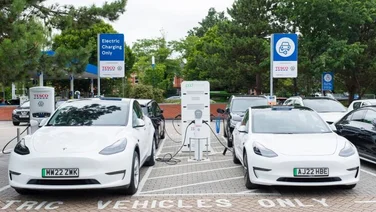We receive a small fee from trusted installers when you request a quote through our site. This helps us keep our content independent, well-researched and up to date – Learn more
✔ You can get a smart meter installed in your home for free
✔ It’ll help you cut your energy bills and emissions
✔ They work for direct debit and prepayment households
By June 2025, every home in the UK will have been offered the chance to get a free smart meter.
This technological advance will help you to keep track of your energy usage, get accurate bills, and understand why you pay what you do for energy.
These features can save you money, which is especially crucial during an energy and cost of living crisis.
Here’s everything you need to know about this excellent upgrade on your old meter, which has already happened to most meters across the country.
What is a smart meter?
A smart meter is an electronic device that measures your energy usage.
This new technology will replace your old meter, and give you and your supplier an accurate, real-time account of how much energy you use.
They can generally be controlled with an app, as well as by using a small monitor called an In-Home Display (IHD) which shows you your usage live.
You’ll only need one smart meter if you get your gas and electricity from the same company, or two if you receive them from different suppliers.
How does a smart meter work?
Once it’s connected to the mains, your smart meter will be able to track your electricity and gas usage.
All the information your meters find will be displayed on your IHD, and automatically sent to your energy company over a secure national communication network.
That means a smart meter won’t use your wifi, so they won’t miss a beat if your internet goes down.
The network is run by the Data Communications Company (DCC), which is owned by Capita, one of the biggest companies in the UK.
Your smart meter will run on your electricity, but a spokesperson for Smart Energy GB (the government campaign in charge of the smart meter rollout) told us the IHD uses “less than £1 per year” of energy.
They also explained that the meter itself uses a similar amount of energy, but said your supplier will cover this cost.

Is it worth getting a smart meter?
Yes, it’s worth getting a smart meter.
You’ll receive free, live information about your energy usage, enabling you to make changes and cut your bills.
You’ll also never have to take a manual reading again. Instead, you can rest safe in the knowledge that your readings are accurate and timely.
A smart meter can make your life easier and thriftier, without costing you anything.
Pros and cons of smart meters
- It’s free
- It'll tell you how much energy you’re using
- You can more easily cut your energy bills
- It'll help you reduce your carbon footprint
- No more manual readings
- They work for direct debit and prepayment customers
- They can occasionally stop working
- Your power has to be out during the installation
- It won’t save you money or fight climate change by itself
The advantages of a smart meter
It’s free
Just request a smart meter from your supplier, and they’re legally compelled to install one at your home – for free.
The cost comes out of everyone’s energy bills, just as it has always done to pay for meters.
That means you can gain all the benefits of this smart piece of technology without having to shell out anything.
It’s a small step to make to improve your home’s energy efficiency, which is something a lot of Brits are doing in light of the energy crisis. In fact, our 2023 National Home Energy Survey revealed that 56% of people have taken measures in the past 12 months to make their home more energy efficient.
It’ll tell you how much energy you’re using
Your smart meter will continuously show your current energy usage, empowering you to change your habits or just prompting you to switch some lights off.
You’ll quickly understand what the optimal energy level looks like for your home, and how it changes at different times – and knowing is half the battle.
You can more easily cut your energy bills
You’ll receive constant information and encouragement from your smart meter, as it shows you your energy consumption falling in response to your actions.
This will help keep you motivated to make more changes that will ultimately result in lower energy bills.
It happens to almost everyone. 86% of smart meter users say they’ve changed their habits in order to use less energy, according to Smart Energy GB.
It’ll help you reduce your carbon footprint
You’ll save money by cutting your energy usage, and you’ll fight climate change too.
Smart meters are an important part of lowering household emissions, which make up 16% of the UK’s carbon footprint.
You’re not individually responsible for the country’s emissions, but if we all play our part, we can make the future better.
No more manual readings
No long will you have to find out where your meter is and taking a reading in the dark, dusty place it’s been left in.
Instead, it’ll automatically sends readings to your energy supplier, ensuring you receive accurate bills that don’t rely on potentially flawed estimates.
And you won’t have to do a thing.
They work for direct debit and prepayment customers
Whether you pay your energy bills by direct debit or prepayment, your smart meter will work perfectly for you.
It can tell you how much you’ve spent on energy throughout the month, quarter, and year, so you’ll be prepared for your bill – or prepared to top up your account.

The disadvantages of a smart meter
They can occasionally stop working
All technology malfunctions every so often, from ladders to cutting-edge machines – and smart meters are no different.
Most households experience no problems with smart meters, but occasionally their smart attributes can fail, their connection to the national smart meter network can drop, or they can stop working completely.
In these rare cases, your energy supplier will be able to help you resolve the situation.
Your power has to be out during the installation
A safe smart meter installation requires the electricity to be turned off in your home.
As the process can take hours to complete, this means you could be left in the dark for a while.
But as long as you plan ahead, this seems like a small price to pay to gain a smart meter.
It won’t save you money or fight climate change by itself
You have to act on the information provided by your smart meter, as it won’t turn off appliances when you’re not using them, or replace your bulbs with LEDs.
The onus is on you to absorb the teachings your smart meter provides, and transform them into energy-saving measures.
If you do though, you can cut your bills and your emissions in a meaningful, long-term way.
Next steps
By now, you’ll know all the many benefits and small disadvantages of getting a smart meter.
You can request a smart meter through Smart Energy GB. Just enter a few details, and you’ll be added to a list.
The aim is for every household to have a smart meter by 2025, but it still shouldn’t take longer than a few months to get one installed – for free.
Frequently asked questions
Is there a downside to having a smart meter?
Smart meters, like all pieces of technology, can sometimes malfunction.
The great majority operate without fault, but they do occasionally stop responding, stop being smart, or fail to connect to their network.
The installation can also take hours – during which time you’ll have to go without power – plus it won’t save you money or fight climate change by itself.
This means you’ll have to adjust your behaviour based on what the smart meter tells you, or it won’t make any difference to your bills or carbon footprint.
Is electricity more expensive with a smart meter?
No, electricity isn’t more expensive with a smart meter.
The price of your electricity will stay the same whether or not you have a smart meter – but the technology may help you to cut your bills.
It can save you money by encouraging changes in your energy usage, and also enable solar panel owners to sell their excess solar power to the grid.
Are smart meters worth getting?
Smart meters are definitely worth getting, because they’re free and can help you save money and energy.As long as you ensure you act on the information you get from your smart meter, you can cut your usage and bills.
86% of smart meter users say they’ve changed their habits in order to use less energy, according to Smart Energy GB.
Will a smart meter lower my bill?
A smart meter will not automatically lower your bill.To cut your bills, you’ll need to make changes according to the data your smart meter gives you.
So keep an eye on your smart meter’s in-home display, which will show you how much energy you’re using.
Make quick changes to lower this number (and therefore your bills), or dive into the daily, weekly, or monthly data to make bigger reductions.








